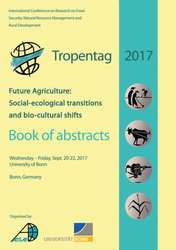| Fachbereiche | |
|---|---|
| Buchreihen (97) |
1382
|
| Nachhaltigkeit |
3
|
| Gesundheitswesen |
1
|
| Geisteswissenschaften |
2372
|
| Naturwissenschaften |
5408
|
| Mathematik | 228 |
| Informatik | 320 |
| Physik | 980 |
| Chemie | 1364 |
| Geowissenschaften | 131 |
| Humanmedizin | 243 |
| Zahn-, Mund- und Kieferheilkunde | 10 |
| Veterinärmedizin | 108 |
| Pharmazie | 147 |
| Biologie | 835 |
| Biochemie, Molekularbiologie, Gentechnologie | 121 |
| Biophysik | 25 |
| Ernährungs- und Haushaltswissenschaften | 45 |
| Land- und Agrarwissenschaften | 1005 |
| Forstwissenschaften | 201 |
| Gartenbauwissenschaft | 20 |
| Umweltforschung, Ökologie und Landespflege | 148 |
| Ingenieurwissenschaften |
1798
|
| Allgemein |
98
|
|
Leitlinien Unfallchirurgie
5. Auflage bestellen |
|
Erweiterte Suche
Tropentag 2017
Future Agriculture: Socio-ecological transitions and bio-cultural shifts
Eric Tielkes (Herausgeber)Vorschau
Inhaltsverzeichnis, PDF (56 KB)
Leseprobe, PDF (180 KB)
Tropentag is an annual international conference on food security, natural resource management and rural development. Tropentag 2017 is organised by the University of Bonn, Germany, jointly with the Council for Tropical and Subtropical Research (ATSAF e.V) in cooperation with the GIZ Advisory Service on Agricultural Research for Development (BEAF). This year’s Conference theme is “Future Agriculture: social-ecological transitions and bio-cultural shifts”.
Future agriculture is by definition an emerging phenomenon. It is continuously in the making, while present visions of the future turn into history. Vast stretches of land in developing countries are being put to new uses, with new forms of governance, new ownership patterns and new forms of production. Particularly agricultural systems are undergoing drastic changes, unfolding an enormous transformative power and affecting millions of people.
System-immanent attributes such as visions, aspirations, cultural specifics and production factor availability shape the response of land users to growing external pressures such as climate change, market demands, land degradation, emerging diseases and policies. In addition to such social-ecological transitions, substantial bio-cultural shifts occur and are imposed by centrally-planned establishments of large-scale intensification (or conservation) corridors and protection zones, or are associated with infrastructure development and urbanisation processes. A wide array of resulting response pathways and land use or production strategies emerge that may be beneficial for rural and urban populations, but can also lead to abandonment of land, migration and conflicts.
| ISBN-13 (Printausgabe) | 9783736996120 |
| ISBN-13 (E-Book) | 9783736986121 |
| Buchendformat | A5 |
| Sprache | Englisch |
| Seitenanzahl | 604 |
| Auflage | 1. |
| Erscheinungsort | Göttingen |
| Erscheinungsdatum | 28.08.2017 |
| Allgemeine Einordnung | Tagungs- und Kongressband |
| Fachbereiche |
Land- und Agrarwissenschaften
|
| Schlagwörter | Developing countries, new forms of governance, new ownership patterns, new forms of production, agricultural systems, climate change, land degradation, emerging disease and policies, infrastructure development, urbanisation processes |








